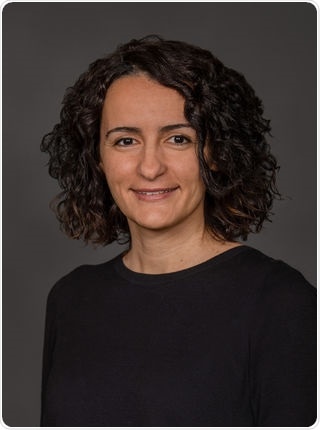Reviewed by Danielle Ellis, B.Sc.Feb 14 2022
A new study has led to the discovery that the Hippo signaling effector YAP1 is a master controller of Nodal signaling in hESCs (human embryonic stem cells) for a process crucial to human development. This research was carried out by scientists from the Lewis Katz School of Medicine at Temple University.

Conchi Estarás PhD, Assistant Professor, Cardiovascular Sciences and Center for Translational Medicine, Katz School of Medicine. Image Credit: Temple University
Our findings may have a wide range of implications, from understanding the process of human development to cancer progression.”
Conchi Estarás PhD, Assistant Professor, Cardiovascular Sciences and Center for Translational Medicine, Katz School of Medicine
Conchi Estarás is also a member of the Cancer Epigenetics Institute at Fox Chase Cancer Center.
Although YAP1 is very active in growth, its activity declines after birth. In adulthood, however, YAP1 is reactivated in several cancer types, including liver cancer.
Our work focuses on understanding the role of YAP in the context of normal stem cells during development. Understanding how YAP1 works in this context will provide us the knowledge necessary to generate new tools to fight against YAP1-driven cancers.”
Conchi Estarás PhD, Assistant Professor, Cardiovascular Sciences and Center for Translational Medicine, Katz School of Medicine
A gastruloid is a tiny collection of cells that imitates gastrula—an early developing structure. Three layers—ectoderm, mesoderm, and endoderm—make the gastruloid. Containing the founder cells of all organs in the human body, these layers make gastrulation and the gastrula a breakthrough developmental stage. Embryonic death or birth defects can be caused as a result of errors in this process.
The right dose of Nodal protein is required for an embryo to grow after the gastrulation process. Previous studies had recommended a role for YAP1 in gastrulation; however, more information was required.
In this research, Estarás and scientists at the Katz School of Medicine and other institutions employed hESCs to make gastruloids in vitro and examine the role of YAP1 in the gastrulation process. To make hESCs cells distinguish into mesoderm, endoderm, and ectoderm cells in the gastruloid structure, researchers utilized 2D micropattern surfaces.
Ethical restrictions forbid the study with human embryos, therefore recreated embryogenesis using in vitro-generated gastruloids allow us to investigate the molecular pathways involved in this essential developmental process.”
Conchi Estarás PhD, Assistant Professor, Cardiovascular Sciences and Center for Translational Medicine, Katz School of Medicine
Two important results were produced by this analysis. Firstly, the team found that YAP1 controls the right allocation of the three-germ layers in the gastruloids. Gastruloids—having YAP1 deleted—had a decreased ectoderm layer with an enlarged endoderm and mesoderm layers.
“The ectoderm is the germ layer that gives rise to the nervous system and the outer surface of the body, such as the skin. The right formation of the ectoderm layer is then essential for the development of the embryo,” Estarás said.
Secondly, the appropriate dose of Nodal protein is necessary for an embryo to grow after the gastrulation process. Estarás and her colleagues discovered that YAP1 is needed to dictate how much Nodal protein is generated in the gastruloid.
“Removing YAP1 in the gastruloid leads to too much Nodal protein, which in turn leads to gastrulation defects. In vivo, this mechanism would lead to developmental arrest,” Estarás concludes.
Source:
Journal reference:
Stronati, E., et al. (2022) YAP1 regulates the self-organized fate patterning of hESC-derived gastruloids. Stem Cell Reports. doi.org/10.1016/j.stemcr.2021.12.012